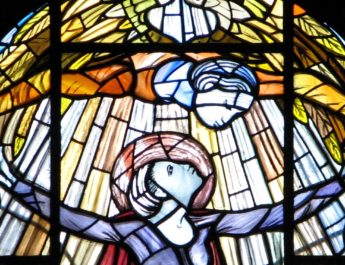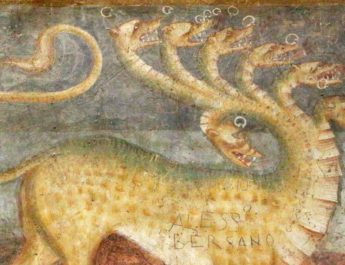Deuteronomy 5:12-15
Narrative Lectionary
BibleHub
12 “‘ObserveA the SabbathB dayC and keep it holy,D
Notes on verse 12a
A “observe” = shamar. This is to keep, watch, or preserve. It means to guard something or to protect it as a thorny hedge protects something.
B “Sabbath” = shabbat. From shabath (to rest, stop, repose, cease working; by implication, to celebrate). This is sabbath, literally meaning rest or intermission.
C “day” = yom. Root may mean being hot. This is the day in a literal or figurative sense. It can also mean birth, age, daylight, continually or other references to time.
D “keep…holy” = qadash. From qodesh (set apart and so sacred; God is different from us and so God is holy/set apart; things we dedicate to God’s service are set apart for God and so they, too, are holy). This is set apart, consecrated, hallowed, sanctified. This is something or someone that is set apart for a holy purpose or use – ceremonially or morally clean.
as the LordE your GodF commandedG you.
Notes on verse 12b
E “Lord” = YHVH. From havah (to be, become) or hayah (to come to pass, become, be). This is the name of the God of Israel, the self-existent and eternal one, the tetragrammaton. This pronunciation has been lost to time so “Lord” is generally used in its place.
F “God” = Elohim.
G “commanded” = tsavah. This is to charge, command, order, appoint, or enjoin. This is the root that the Hebrew word for “commandment” comes from (mitsvah).
13 SixH days you shall laborI and doJ allK your work.L
Notes on verse 13
H “six” = shesh. This is six. Figuratively, it can be a surplus since it is one more than the number of fingers on the hand.
I “labor” = abad. This is to work, serve, or compel. It can describe any kind of work or service (including religious devotion). Also, till or cultivate. Used causatively, it can mean to enslave or keep in bondage.
J “do” = asah. This is to make, do, act, appoint, become in many senses.
K “all” = kol. From kalal (to complete). This is all or every.
L “work” = melakah. From the same as malak (messenger, an angel, or a deputy; human messengers literally or for prophets, priests, or teachers as messengers of God; also supernatural messengers i.e. angels). Properly, this is a deputyship or some kind of work. It can also be the product that comes from labor.
14 But the seventhM day is a Sabbath to the Lord your God; you shall not do anyN work—you, or your sonO or your daughter,P
Notes on verse 14a
M “seventh” = shebii. From sheba (seven – the number of perfection/sacred fullness). This is seventh.
N “any” = kol. Same as “all” in v13. See note K above.
O “son” = ben. From banah (to build or obtain children). This is son, age, child. It is son in a literal or figurative sense.
P “daughter” = bat. Related to “son” in v14. From ben (see note O above). This is daughter in a literal or figurative sense.
or your maleQ or female slave,R or your oxS or your donkey,T
Notes on verse 14b
Q “male” = ebed. Related to “labor” in v13. From abad (see note I above). This is a servant, slave, or bondservant.
R “female slave” = amah. This is female servant or slave, handmaid.
S “ox” = shor. Perhaps from shur (to travel, turn, journey; travelling like a prostitute or a merchant). This is bull, ox, head of cattle, cow.
T “donkey” = chamor. From chamar (to be red, blush). This is a male donkey.
or any of your livestock,U or the resident alienV in your towns,W so that your male and female slave may restX as well as you.
Notes on verse 14c
U “livestock” = behemah. This is animal or cattle. It is often used of large quadrupeds.
V “resident alien” = ger. From gur (to abide or sojourn; to leave the road to lodge or for any other reason). This is sojourner, guest, stranger, foreigner.
W “towns” = shaar. May be related to sha’ar (to calculate or reckon; may come from a root that means to open up or split). This is a gate, door, or other opening like a port.
X “rest” = nuach. This is to rest, calm, camp, free, place, remain, satisfy, settle, station, or wait. It is rest and so implies settling down in a literal or figurative sense. This is perhaps the root verb of the name “Noah.”
15 RememberY that you were a slaveZ in the landAA of Egypt,BB
Notes on verse 15a
Y “remember” = zakar. This is to remember, to mark something so that it can be recalled, to be mindful of, to mention.
Z “slave” = ebed. Same as “male” in v14. See note Q above.
AA “land” = erets. Root may mean to be firm. This is earth, ground, field land, or country.
BB “Egypt” = Mitsrayim. Perhaps from matsor (besieged or fortified place, bulwark, entrenchment; something hemmed in; a siege or distress or fastness); from tsur (to confine, besiege, to cramp). This is Egypt.
and the Lord your God broughtCC you out from there with a mightyDD handEE
Notes on verse 15b
CC “brought” = yatsa. This is to go or come out, bring forth, appear. It is to go out in a literal or figurative sense.
DD “mighty” = chazaq. From chazaq (to strengthen, seize, be courageous, repair, bind, heal, conquer, harden). This is strong, hard, powerful, loud, bold, violent, impudent. It is usually strong in a negative sense.
EE “hand” = yad. This is hand, ability, power. Hand in a literal sense, but also what one can do or the means by which one does it.
and an outstretchedFF arm;GG thereforeHH the Lord your God commanded you to keepII the Sabbath day.
Notes on verse 15c
FF “outstretched” = natah. This is to stretch or spread out, to extend, or bend. In can also imply moral deflection.
GG “arm” = zeroa. Perhaps from zara (to sow, scatter seed, conceive). This is the arm, shoulder, or foreleg of an animal. It is figuratively used for power, force, might, or help.
HH “therefore” = ken. Perhaps from kun (properly, in a perpendicular position; literally, to establish, fix, fasten, prepare; figuratively, it is certainty, to be firm, faithfulness, render sure or prosperous). This is to set upright. Generally used figuratively to mean thus, so, afterwards, rightly so.
II “keep” = asah. Same as “do” in v13. See note J above.
Image credit: “Paradise” by August Macke and Franz Marc, 1912




